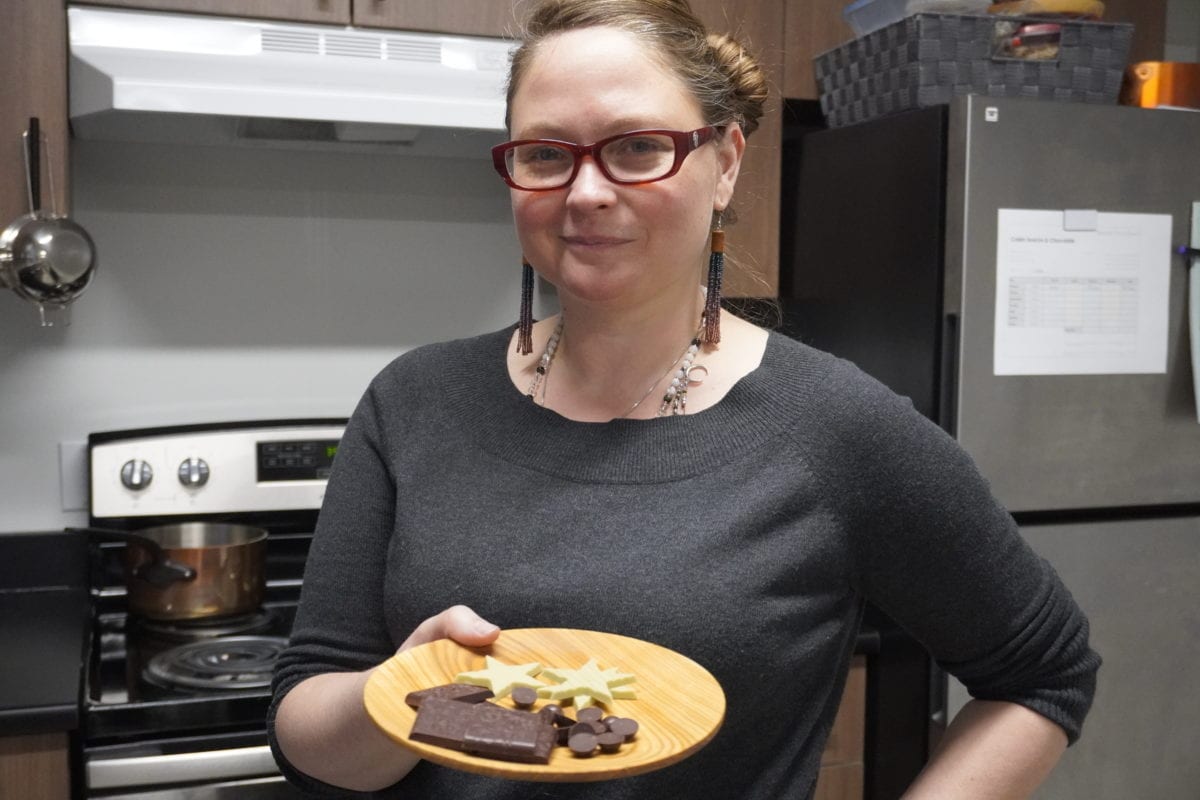It’s no secret that the chocolate industry can be shady business.
Before Cabin Snacks and Chocolate became foraged wild food chocolate bars, Sarah Van Stiphout originally sought to make baked goods with forest harvests and use chocolate as an additional ingredient.
When she saw how difficult it would be to find ethical, sustainably sourced chocolate at a reasonable price point she set out to make it herself.

Van Stiphout experiments with wild berries, spruce gum, and other forages from around her off-grid cabin to make small batch dark chocolate bars wrapped in compostable packaging and sold as a product sustainable from bean to bar.
It hasn’t always been a sweet ride for the chocolate shop, which is in its second year.
Van Stiphout said she’s thought many times about pulling the plug on the operation, particularly as the pandemic prompted order cancellations from retailers across the country.
“By this time, I thought that I would have three or four employees, I thought that my bars would be shipped all across the country,” she said. “It was set up, but the pandemic hit.”
This time last year Van Stiphout recalls selling about 100 bars an hour at holiday markets.
“I couldn’t keep up, I sold out at every single market,” she said. “I was really excited about this year’s market season and now it’s not happening.”
Still Van Stiphout is rebuilding with optimism.
After operating out of temporary kitchens for about 18 months, Cabin Snacks has found a home in the upstairs of the Copperhouse building which Van Stiphout has renovated into a full commercial kitchen.
The space is a long way from Van Stiphout’s humble beginnings making chocolate out of her cabin on the Ingraham Trail. She recalls making her first batch of toffee – a key component for her most popular boreal toffee bar. At the time she was using a headlamp and “a little propane burner,” that she set outside to cool. Shortly thereafter she said a fox had stolen her pan.

From her new commercial space, Van Stiphout stores her beans cacao beans – in shipments of 50-kilogram burlap sacks – roasts them, separates cacao nibs from husks, refines the nibs to combine with sugar and cacao butter and processes the used-to-be beans into chocolate. The whole process could take anywhere from one week to three months, she said, depending on how much she lets the chocolate age – a process that she explains enhances its flavours.
Van Stiphout said that though she has had some failed attempts, she loves experimenting and playing around with different ingredients. Among her current experiments – beer chocolate.
She cautioned that the partnership is still in its early stages, however Cabin Snacks and the Woodyard Brewery are working on a beer chocolate, and conversely chocolate beer collaboration.

For now Cabin Snacks can mostly be bought through the Copperhouse takeout menu, though it will soon be sold at the Co-op. Van Stiphout is also considering launching a monthly chocolate bar subscription box.
Throughout the uncertainty of the pandemic, Van Stiphout said her biggest takeaway is remembering it’s okay to ask for help – something that is easier said than done for Van Stiphout.
“There is a lot of people with invaluable information that are always willing to share,” she said. “You don’t have to figure it out all on your own.”
Especially as a new business owner, Van Stiphout said that connecting with her mentor has been a game-changer.
“I can message her, and she will talk me through anything and give me advice,” she said.
Van Stiphout connected with her Nova Scotia-based mentor through social media. She recalls visiting Halifax shortly after her foray into chocolate making and reaching out over Instagram.
“I messaged her, and she just took me on. I was really lucky,” Van Stiphout said.
“She doesn’t withhold any information and it’s really quite fascinating that people will share all of their trade secrets that they might have taken a year to learn and I can just get that information. I pass that information on to other chocolate makers as well.”
Van Stiphout admits there have been tough times in running Cabin Snacks but said the community support has been “shocking.”
“I wasn’t even sure if Yellowknife would be into dark chocolate,” she said. “Usually people taste their mom’s baking chocolate from the cupboard, and it’s disgusting as kids. And then they have this idea that dark chocolate is awful. But there’s a lot of people that are (into dark chocolate). And every time I make a new bar they want to try it. I think that is just so encouraging.”


You have to be a very strong, devoted person to get to were you are. Proud to know you and watch as your business grow.
Wish we could try it here in Ontario.